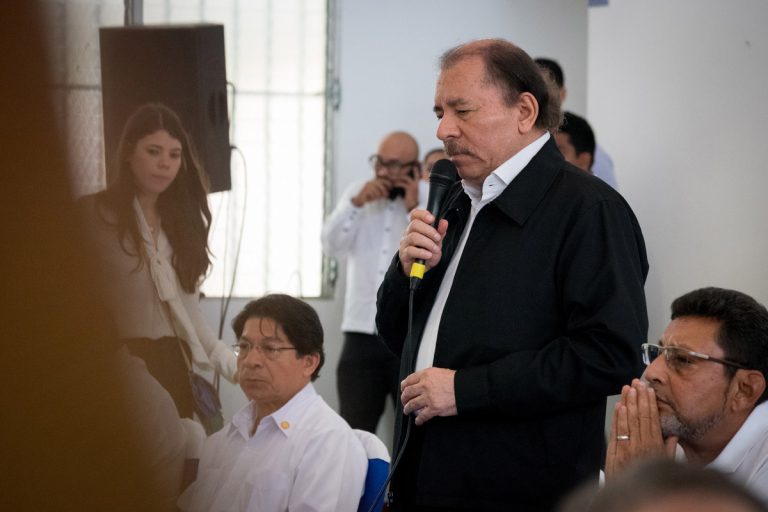12 de junio 2018

Children of Exile: The Births “Sowing Hope” in the Camp of Nicaraguan Farmers

PUBLICIDAD 1M
PUBLICIDAD 4D
PUBLICIDAD 5D
Medardo Mairena, peasant leader: “Ortega is proposing to advance the elections, when we are asking for his resignation.”

MESENI inicia labores: Se reunió con Alianza Cívica
President Daniel Ortega told the United States Government his willingness to hold early elections in Nicaragua, as a measure to resolve the crisis affecting the country and that has left 146 dead, according to the verified count of the Nicaraguan Center for Human Rights (CENIDH).
That proposal was presented to the bishops and the Civic Alliance that participate in the suspended National Dialogue by US Ambassador Laura Dogu and Caleb McCarry, a delegate of the Senate Foreign Relations Committee who visited Nicaragua over the weekend, informed Medardo Mairena, coordinator of the National Council for the Defense of Land, Lake and Sovereignty.
McCarry was sent by Republican Senator Bob Corker, chairman of the Committee, “in order to accompany and support the National Dialogue led by the Nicaraguan Bishops’ Conference and after he spoke with the State Department,” the embassy said in a statement.
Dogu and McCarry met over the weekend with the bishops – mediators of the dialogue – and with the members of the Civic Alliance – which brings together students, business people, peasants, academics and representatives of civil society – to inform them, according to the press release, that they support the proposal of the Church “to end the violence and be able to advance the negotiations” to try to find a way out of the crisis.
The press release does not state, however, that both McCarry and Dogu informed that Ortega would be willing to advance elections, without mentioning a specific date, although some sources close to the Sandinista Front affirm that these could be carried out in 2019. That’s to say that Ortega would remain in power until that date, contrary to the popular clamor that demands his immediate exit from the Presidency.
“Ortega is proposing to advance the elections, when we are asking for his resignation,” said Mairena in a communication with the peasants who maintain the roadblocks in different points of the interior of the country. “Therefore, we know we have him crazy with the roadblocks, cornered by the pressure, although he continues to kill us,” he added.
“If he is saying that he is advancing elections, that he allows them to be supervised, with all the guarantees, that is an advance, product of the pressure we have applied, but we remain firm, because we cannot allow him to continue governing, because he is killing us,” Medardo said. “Ortega says elections without resigning, we demand his resignation and then elections,” he said.
Nicaragua completes 55 days of the worst political and social crisis of the last forty years, which began on April 18, after Ortega imposed a reform to Social Security rejected by employers and the population in general. The crisis was exacerbated by the bloody response of the regime to the demonstrations.
Hundreds of thousands of Nicaraguans demand the immediate departure of Ortega from power, and call for justice for the victims of the massacre. The president is expected to respond today to the proposal of democratization that last Thursday the bishops delivered him. That day Ortega requested 48 hours of “reflection” that lasted until Tuesday, while the president has maintained a brutal repression throughout the country, which produced at least six additional deaths in recent hours, in Managua, Masaya, and Jinotega.
Archivado como:
PUBLICIDAD 3M
Confidencial es un diario digital nicaragüense, de formato multimedia, fundado por Carlos F. Chamorro en junio de 1996. Inició como un semanario impreso y hoy es un medio de referencia regional con información, análisis, entrevistas, perfiles, reportajes e investigaciones sobre Nicaragua, informando desde el exilio por la persecución política de la dictadura de Daniel Ortega y Rosario Murillo.
PUBLICIDAD 3D